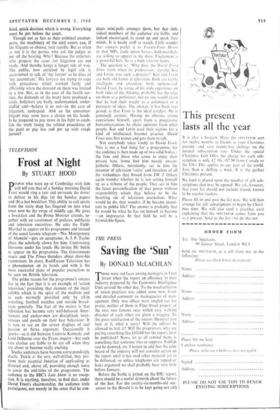Frost at Night
TELEVISION By STUART HOOD pEOPLE who were up at Cambridge with him will tell you that of a Sunday morning David Frost would ring a taxi and persuade the driver to deliver to his digs (a) the Sunday papers and (b) a hot breakfast. This ability to call spirits from the vasty deep has lingered on into what must now be the verge of middle age. He gives a breakfast and the Prime Minister attends, to- gether with an assortment of prelates, publicists and television executives. He asks the Field- Marshal to appear on his programme and instead of the usual laconic telegram—No. Montgomery of Alamein'—gets an acceptance. A. J. P. Taylor plays the scholarly clown for him. Controversy blossoms under his touch. He invites Mr Smith to appear on his programme. The Government reacts and The Times thunders about show-biz razzmatazz. In short, Rediffusion Television has a phenomenon on its hands and with it the most successful piece of popular journalism to be seen on British television.
The prime reason for the programme's success lies in the fact that it is an example of `action television,' providing that element of the incal- culable which is the spice of the medium and as such normally provided only by all-in wrestling, football matches and outside broad- casts generally. The fact of the matter is that television has become very well-behaved. Inter- viewers and anchor-men are disciplined; inter- viewees and panels on their best behaviour. It is rare to see on the screen displays of real passion or fierce argument. Occasionally it sparks—as it did between Ludovic Kennedy and Lord Dilhorne over the Evans inquiry—but such rare clashes are liable to be cut off when they are about to become really exciting.
Studio audiences have become correspondingly docile. Tickle o' the sere, well-drilled, hey per- form their essential function of applauding as directed and, above all, providing enough noise to cover the end-titles of the programme. The audience to the BBC's Late Show is no excep- tion. It is startling, therefore, to find that, under David Frost's chairmanship, the audience truly participates, not merely in the sense that he con- ducts mini-polls amongst them, but that indi- vidual members of the audience are liable, and indeed encouraged, to stand up and speak their minds. It is heady stuff to watch. Little wonder that viewers prefer it to Twenty-Four Hours or that MPs, trade union bosses, field-marshals, are willing to appear in the show. Excitement is a powerful bait. So is a high viev ing figure.
The question is: 'Why does the David Frost Show work when its predecessor, starring Kee and Levin, was such a disaster?' Kee and Levin are both old hands at television. Both are highly intelligent and articulate; both opinionated. David Frost, by virtue of his wide experience on both sides of the Atlantic, probably has the edge on them as a performer, but no one would claim that he had their weight as a polemicist or a purveyor of ideas. The answer, it has been sug- gested, is that Frost is the ideal catalyst. He is genuinely curious. Having no obvious strong convictions himself, apart from a progressive humanitarianism, he elicits opinions from other people. Kee and Levin used their victims for a kind of intellectual bayonet practice. David Frost uses first names and gets them to talk.
Not everybody takes kindly to David Frost. This is not a bad thing for a programme, for the audience is then made up of two solid bodies : the fans and those who come to enjoy their private hate. Some find him merely unsym- pathetic. Others, mistakenly, see in him the inventor of television 'satire' and therefore of all the wickedness that flowed from TW 3. Others again wonder whether he is not setting himself up as a tribune of the people. They see in him the latest personification of that power without responsibility which they believe to be the besetting sin of television journalism. What would he do, they wonder, if he became impor- tant in public life? The answer is probably that he would be what he has set himself to become —an impresario. In that field he will be a formidable figure.


































 Previous page
Previous page